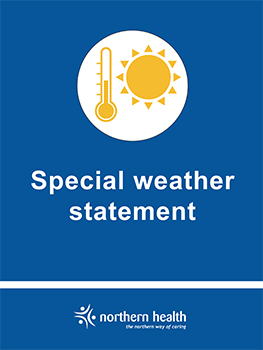We’re experiencing more frequent and intense hot weather in Northern BC and across the province and it’s helpful to know how you can be prepared. Prolonged exposure to indoor temperatures over 31° C can create stress on the body that can be harmful for vulnerable people, putting them at increased risk. Illness and death associated with extreme heat can be prevented. It’s important to know where to find trusted sources of information regarding heat and to be clear on when you should prepare and when you should act.
Hot weather 101
The following people are more likely to experience health impacts because of heat and need to be prepared and supported, particularly if they do not have access to air conditioning:
- Older adults (65+)
- People who live alone
- People with pre-existing health conditions such as diabetes, heart disease, or respiratory disease
- People with mental illness such as schizophrenia, depression, or anxiety
- People with substance use disorders
- People with limited mobility
- People who are marginally housed
- People who work in hot environments
- People who are pregnant
- Infants and young children
Environment and Climate Change Canada (ECCC) provides a variety of weather alerts and information. If you have a smartphone, you can download the WeatherCAN app which provides weather alert notifications for your area. Pay attention to trusted media sources, ECCC, and Emergency Info BC for accurate weather forecast information. In Northern BC, daytime temperatures of equal to or greater than 28-29°C and overnight temperatures of equal to or greater than 13-14°C are used to understand if seasonal norms are being exceeded. Homes are more difficult to cool when overnight temperatures are high.
Heat alert levels:
| Alert | Threat | Action |
| Heat Warning | Very hot – Moderate public health risk - Daytime and overnight temperatures are higher than seasonal norms and holding steady. This may happen one to three times during the season. | Take usual steps to stay cool. |
| Extreme Heat Emergency | Dangerously hot – High public health risk - Daytime and overnight temperatures are higher than seasonal norms and getting hotter every day. This may happen once or twice every 10 years, but this frequency is increasing because of climate change. | Activate your emergency plan. |
Prepare for any heat warnings
Even before a heat warning is issued, there are things you can be doing to prepare. Get the whole family involved and talk about heat plans in advance of having to use them.
-
Identify cool zones inside your home or nearby, such as a shaded outdoor location or air-conditioned space where you can cool off on hot days.
-
Consider places in your community to spend time, such as libraries, community centres, religious spaces, movie theatres or shopping malls. Shut windows and close curtains or blinds during the heat of the day to block the sun and to prevent hotter outdoor air from coming inside. Open doors and windows, and use fans when it is cooler outside to move cooler air indoors.
-
Cool down by applying cool cloths and drinking plenty of water.

Special weather statements and alerts provide advanced warning of high temperatures. -
Check in regularly with vulnerable family members and neighbours.
-
Never leave children or pets alone in a parked car.
Be prepared for extreme heat
Northern BC might not have extreme heat right now, but it’s always good to prepare for that potential occurrence. Advance awareness and preparation can make a big difference for the physical health, mental health, and the well-being of you and your loved ones. Prepared BC has an excellent website and Extreme Heat Preparedness Guide which can help you, your friends and family prepare. Here are some highlights:
-
Identify those who are at risk: Consult the list provided earlier in this story.
-
Evaluate if you can stay at home: If you are at risk and you live in a building or residence that gets very hot, with inside temperatures of 31°C or higher, plan to go elsewhere during an Extreme Heat Emergency.
-
Evaluate your home’s cool zones: During an Extreme Heat Emergency, you should prepare to stay in the coolest part of the residence and focus on keeping that one location cool.
-
Identify other locations to get cool: If it is not safe for you to stay at home, consider staying with friends or family that have air conditioning or cooler spaces. Alternatively, identify places in your community you can visit to get cool.
-
Identify an extreme heat buddy: If you live alone, find an extreme heat buddy to check in on you when it gets hot, and who you can also reach out to for help.
-
Prepare your home: For instance, install an air conditioner in at least one room, use indoor/exterior window coverings, have an accurate thermometer to monitor indoor temperature, and close windows during the day (10 am) and open them at night (8 pm) to let cooler air inside.
-
Know where to find information: Pay attention to the media, Environment Canada, Emergency Info BC and your health authority for more information about Heat Warnings and Extreme Heat Emergencies.
-
Activate your plan to stay cool: If you cannot stay cool at home, move to your pre-identified alternate location with air conditioning or cooler spaces.
-
Stay cool inside: In addition to the previous tips, have ice and jugs of cool water on hand, sleep with a wet sheet or in a wet shirt, take cool baths or showers to draw heat from your body, drink plenty of water.
-
Stay cool outside: Sleep outdoors if you can safely do so, avoid strenuous activity or be active when it’s cool, never leave children or pets in a parked car, stay in the shade, spend time in treed areas or near bodies of water.
What to do if you are getting too hot
Overheating can be harmful to your health and potentially deadly. If you’re experiencing symptoms such as rapid breathing, rapid heart rate, extreme thirst, and decreased urination with an unusually dark yellow colour, take immediate steps to cool down and seek emergency care: get medical attention, or call 9-1-1 or your local emergency number, submerge yourself or the person you’re helping in cool water, remove clothes and apply wet cloths to the skin.
-
Check in with your heat buddy and neighbours: Consider checking in on your pre-identified heat buddy, as well as your neighbours - especially those that are homebound or alone. Check in multiple times a day, especially later in the day when it is hottest.
-
Prepare for wildfires and smoke: Heat poses a bigger risk than smoke for most people, so prioritize staying cool. See Wildfire smoke during extreme heat events.
If you are taking medication or have a health condition, ask your doctor or pharmacist if it increases your health risk in the heat and follow their recommendation. If your doctor limits the amount of fluid you drink, or has you on water pills, ask how much you should drink while the weather is hot.
If you work in a hot environment, discuss and act on ways to decrease heat exposure with your employer and coworkers. See Heat stress - WorkSafeBC
See the Canadian Mental Health Association’s advice about Coping with natural disaster stress if you are struggling.
Other helpful resources
- Be prepared for extreme heat and drought - Province of British Columbia
- Beat the Heat - HealthLink BC
- Health checks during extreme heat events - National Collaborating Centre for Environmental Health (NCCEH)
- Preparing for Heat Events - BC Centre for Disease Control (BCCDC)














Comments